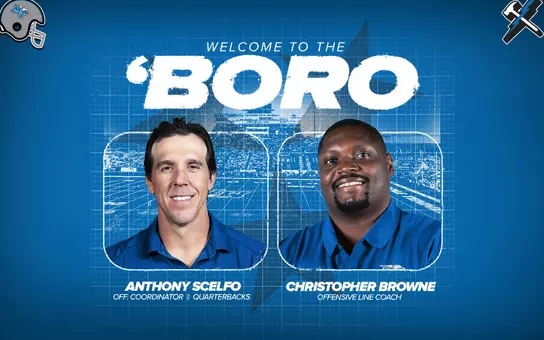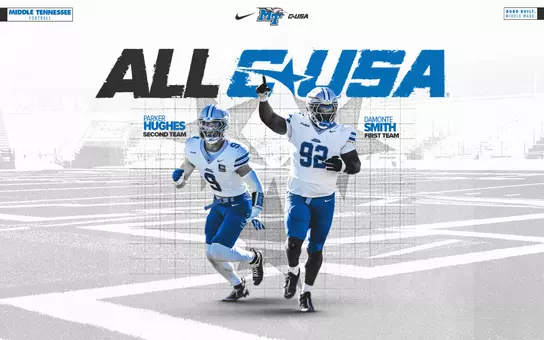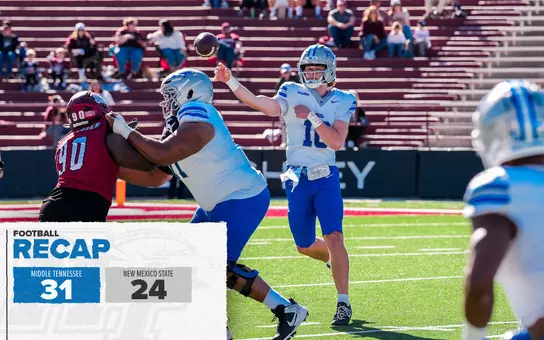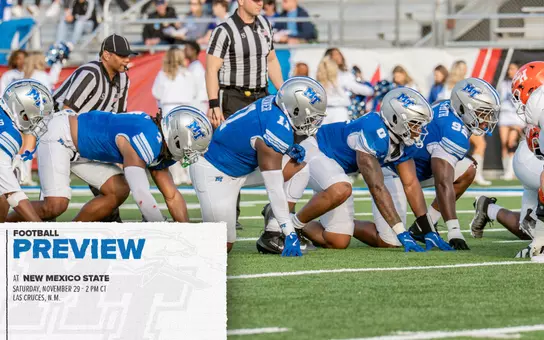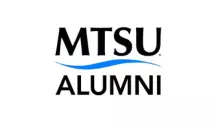Middle Tennessee State University Athletics
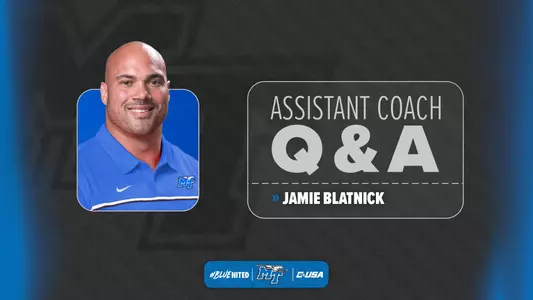
“We're doing a lot of things that they've never before, a lot of movements they've never done before” - Q&A with Director of Strength and Conditioning Jamie Blatnick
2/15/2024 6:00:00 PM | Football
The former Oklahoma State defensive end is already making his mark on the Blue Raider Weight Room
MURFREESBORO, Tenn. — Jamie Blatnick's day on the campus of Middle Tennessee State University often starts at 4:30 a.m. If he's lucky, the Blue Raiders' new Director of Strength and Conditioning might leave before 8 p.m.
When you're setting a culture in the weight room, as well as adjusting to living in a new state while also learning how to run a department's strength and conditioning program all at once, there's no detail that can be left unturned.
"Scheduling around class schedules was the bane of my existence," Blatnick said, recalling his first few weeks on the job. "I think I spent the whole first two weeks thinking we're good, then guys change...You really have to be detailed on it, because we share that weight room with every sport. Some other times may work, but other sports are training there."
A former All-Big XII defensive lineman at Oklahoma State, Blatnick still keeps his Big XII Defensive Play of the Week award from October 17, 2011 behind his desk in his new office in the Emmett and Rose Kennon Sports Hall of Fame, alongside his myriad of strength and conditioning certifications, his pair of OSU degrees and a plethora of Strength and Conditioning technique books from sources like Westside Barbell, Louie Simmons and even the Soviet Powerlifting trainers from the peak of the USSR's Olympic powers.
A former NFL lineman, Blatnick dove into sales shortly after his cup of coffee in the League and found early success. But he said the impact he can make teaching weightlifting always was in the back of his mind, starting with teaching high school kids near him in the Dallas area where he was based and then joining the strength staff at Oklahoma State, where he crossed paths with Derek Mason.
Just talking about the gains student-athletes have started to make in their time in Murfreesboro had Blatnick's smile light up ("We're on week three and we've got guys up seven, eight pounds, some 10-12," Blatnick said.), even more than when he's breaking down his philosophy for attacking the weight room for a team.
"Once you see the whole team, you start getting a trend," Blatnick explained. "The whole team needs stronger cores and low backs. They need better hip mobility; they need much better shoulder mobility. So, let's attack these for the masses, then as guys start to correct it, then we find another one."
The key to that focus working, Blatnick noted, is being flexible at what you're working on day-to-day, while having the discipline to do everything the right way. A challenge for the Blue Raiders under his care, to be sure, but one Blatnick is excited that many are meeting in his first few months on the job.
"You're not going to know exactly what we're going to," Blatnick said of his rotations of exercises between sessions. "You'll just know we're doing an upper dynamic day or a lower max day."
To learn more about what the Blue Raiders are up to in the weight room, GoBlueRaiders.com Staff Writer Sam Doughton sat down with Blatnick earlier this month. The two discussed Blatnick's intense focus on the details, how he developed his own strength program and philosophy, what attracted him to the MTSU job and the challenges of being a mid-school year hire.
The conversation has been edited and condensed for clarity and space.
--
You've been with the guys for a few weeks now since everyone got back from winter break. What's your first impression as they've started their work with you in the weight room so far?
The first impressions have been great. It's a lot of learning for them. We're doing a lot of things that they've never done before, a lot of movements they've never done before. It took us really these first three weeks to build that foundation, my expectations, my standards and the discipline that we're going to have in there, because we're not going to vary from those standards. We're going to do things the right way, we're going to do it this way or we're not going to do it all. We're going to do extra work.
That's been on time, that's wearing the same clothes. That's not wearing head coverings. All those little details.
Why are those little things so important?
Because I've lost a Big XII Championship by this much *holds up his fingers*, an inch. That's the difference between winning and losing, an inch. Is that 'Did I line up a half yard too deep in the backfield? Was I not tight enough to my man? Was I not shaded in the right position?' That all matters.
We do that in the weight room. Your foot placement? Matters. Your chest placement? Matters. Where your hips are? Matters. The tempo? Matters. The reps? Matter. The focus, it's all about focus. The weight room, I tell those guys we don't build any muscle, we only break muscle down. We build focus while we're here and that focus will carry over. Your attention to detail, is that the right amount of weight on there? Is that the 5-10-2? Is this executed properly? Because if you execute this properly at the tempo I'm pushing you at, you'll execute out there properly, you just can't turn it on on Saturday.
And then the callus when they're in the weight room. When I've got four sets of 25, those last eight? You're going to want to stop. You're going to start to lose focus. That's when your partner motivates, that's when you focus in, and you finish. And that took a little bit for them to get into it.
And that's a little different too if you're doing that many sets with that many reps. That's pretty different than most weight programs.
It'll depend on the movement. Open chain movements? We run them up. Our barbell work is really 20 percent of our lift. Everything else is special exercises, accessory movements. I find weak muscle groups, whether it be the hips, the low backs, the core, the glutes. We hammer those on our accessory movements. To build the volume up there, to build the strength up in those lagging muscle groups. Then all the other stuff comes right up.
If you have 500 lb. legs and a 300 lb. low back, what's going to go out when you're squatting? The 300 lb. low back, because it can't handle it, it can't stabilize it. So, we'll build the low backs up. I can work that, instead of squatting them more. They'll be safer, they can train at a lighter weight. And then when they come back to squatting, it shoots through the roof. Guys are 60, 80, 100 pounds up in an offseason.
Same with the bench press. We'll hit our benches, then everything else is accessory. Triceps, upper back, traps, shoulders. We don't have to press, press, press. Ultimately, what that does is their shoulders start to roll. So, we bring that back, we focus on their posterior chain, that's our main focus every day, that's where the power is at.
Rob Glass was a big mentor for you at Oklahoma State, both as a strength coach as a player as well as a colleague and boss when you joined his staff. How have you taken what you've learned from him and learned from others and made it your own?
He's my foundation. The foundation for what I do is definitely him. The intensity, the volume. The types of lifts I use are different. He's very Olympic based, a lot of strength coaches are very Olympic based. I'm not. We don't do any Olympic lifts. We may introduce some snatches or some push jerks. Other than that, I don't do them.
The reason why I don't do them is that football players, anthropometrically, aren't built to catch power cleans. Those guys (Olympic weight lifters) are long torsoed, short limbed. Look at the Olympics, look at China. They have anthropometric measurements. We want long guys. A dead lift is better for them than a power clean. They'll get more out of a dead lift because, anthropometrically, they're better at it. The world record dead lift holder is 6-foot-8.
So, you say, 'Ok, this doesn't quite work for these guys. Let's switch it.' I do a little of those Olympic lifts. I do a lot more plyometric box jumps, that's how I supplement my explosive power. And we do a lot of speed squats. The most they've ever squatted now has been triples. But we do them fast. It's about developing speed. We develop absolute strength two days a week and we develop speed strength (the rest of the week). And explosive strength is sprinkled on both (types of) days. Speed strength Thursday-Fridays, Absolute Strength Monday-Tuesdays and explosive strength is sprinkled in there as warm ups, plyometric starters or field work.
Of course, your main focus is football. But your position also oversees the rest of the strength and conditioning program for every other sport MTSU sponsors. What has getting to know the existing staff been like as they work with their sports?
It's been smooth. I let them do what they see fit for their team and what they've been doing. Because they know their athletes. It would be unwise of me to come in there and say, 'You need to do this,' because they know their guys. So, I just check in with them, make sure they're keeping good documentation, they're detailing their workouts. And also, that they're doing the same thing we're doing for all football players, which is holding them accountable. Your players should rack the weights where they're supposed to go. They should not leave it a mess. They should follow these weight room policies and procedures just like all of us are going to do.
That just builds a culture. They know, ok, logos are facing out on the plates, clips go on the five and the 10. This bar goes on the rack at level 10. Safeties are at a three. Details, details, details. That way, they don't just walk out of there and leave it a mess and that's more work for us. They'll put it back together and they'll respect it. They'll come in here with a good attitude and have some pride.
What was it about this opportunity that made you want to leave your alma mater and take a crack at running your own weight room?
Coach Mason was the biggest factor. I got to spend a lot of time with him when he was at Oklahoma State. I got to tell that he was an empathetic man. He cared. He's a man of his word. And that means a lot to me, because I am too. If I say we're going to do it, we're going to do it. And we just get stuff done. We just meshed well. If it wasn't Coach Mason, I don't know if I would've left. But because it was Coach Mason, I was interested. Where's it at? Tennessee? Ok. Talk to the wife. Do you want to move to Tennessee? Alright, let's do it.
Speaking of which, I heard you ran into one of our basketball teams in the airport in Texas coming back from Stillwater. I think that's something that maybe gets lost in these transitions, that a lot of coaches who are hired mid-year have their families still back where y'all were this fall to finish up the school year. What's that part of the transition been like?
This is my first time doing it. And it's been hard. I miss my kids. I miss my wife. It's really hard. But at the same time, I stay really busy, so I don't have time to think about it too much. Luckily for me, flying from Nashville to Stillwater, with one stop in Dallas, it's a pretty good gig. I can fly right into Stillwater. We get done with the weight groups, I can leave in the evening, be there that night and spend the weekend, which is good.
But we're trying to locate some property here, eventually get them moved up. They'll definitely do it by the summer. I've got a three-year old and a five-year old. It's just tough, because they may not remember it when they get older, but right now they don't quite understand it. Luckily, I went and bought an iPhone, because my wife's got an iPhone, I've got an android and my other coaches are on iPhone, so they peer pressured me into getting one.
But the best thing about it is the FaceTime, so I can FaceTime my kids. I FaceTime them daily. That's been very helpful.
When you're setting a culture in the weight room, as well as adjusting to living in a new state while also learning how to run a department's strength and conditioning program all at once, there's no detail that can be left unturned.
"Scheduling around class schedules was the bane of my existence," Blatnick said, recalling his first few weeks on the job. "I think I spent the whole first two weeks thinking we're good, then guys change...You really have to be detailed on it, because we share that weight room with every sport. Some other times may work, but other sports are training there."
A former All-Big XII defensive lineman at Oklahoma State, Blatnick still keeps his Big XII Defensive Play of the Week award from October 17, 2011 behind his desk in his new office in the Emmett and Rose Kennon Sports Hall of Fame, alongside his myriad of strength and conditioning certifications, his pair of OSU degrees and a plethora of Strength and Conditioning technique books from sources like Westside Barbell, Louie Simmons and even the Soviet Powerlifting trainers from the peak of the USSR's Olympic powers.
A former NFL lineman, Blatnick dove into sales shortly after his cup of coffee in the League and found early success. But he said the impact he can make teaching weightlifting always was in the back of his mind, starting with teaching high school kids near him in the Dallas area where he was based and then joining the strength staff at Oklahoma State, where he crossed paths with Derek Mason.
Just talking about the gains student-athletes have started to make in their time in Murfreesboro had Blatnick's smile light up ("We're on week three and we've got guys up seven, eight pounds, some 10-12," Blatnick said.), even more than when he's breaking down his philosophy for attacking the weight room for a team.
"Once you see the whole team, you start getting a trend," Blatnick explained. "The whole team needs stronger cores and low backs. They need better hip mobility; they need much better shoulder mobility. So, let's attack these for the masses, then as guys start to correct it, then we find another one."
The key to that focus working, Blatnick noted, is being flexible at what you're working on day-to-day, while having the discipline to do everything the right way. A challenge for the Blue Raiders under his care, to be sure, but one Blatnick is excited that many are meeting in his first few months on the job.
"You're not going to know exactly what we're going to," Blatnick said of his rotations of exercises between sessions. "You'll just know we're doing an upper dynamic day or a lower max day."
To learn more about what the Blue Raiders are up to in the weight room, GoBlueRaiders.com Staff Writer Sam Doughton sat down with Blatnick earlier this month. The two discussed Blatnick's intense focus on the details, how he developed his own strength program and philosophy, what attracted him to the MTSU job and the challenges of being a mid-school year hire.
The conversation has been edited and condensed for clarity and space.
--
You've been with the guys for a few weeks now since everyone got back from winter break. What's your first impression as they've started their work with you in the weight room so far?
The first impressions have been great. It's a lot of learning for them. We're doing a lot of things that they've never done before, a lot of movements they've never done before. It took us really these first three weeks to build that foundation, my expectations, my standards and the discipline that we're going to have in there, because we're not going to vary from those standards. We're going to do things the right way, we're going to do it this way or we're not going to do it all. We're going to do extra work.
That's been on time, that's wearing the same clothes. That's not wearing head coverings. All those little details.
Why are those little things so important?
Because I've lost a Big XII Championship by this much *holds up his fingers*, an inch. That's the difference between winning and losing, an inch. Is that 'Did I line up a half yard too deep in the backfield? Was I not tight enough to my man? Was I not shaded in the right position?' That all matters.
We do that in the weight room. Your foot placement? Matters. Your chest placement? Matters. Where your hips are? Matters. The tempo? Matters. The reps? Matter. The focus, it's all about focus. The weight room, I tell those guys we don't build any muscle, we only break muscle down. We build focus while we're here and that focus will carry over. Your attention to detail, is that the right amount of weight on there? Is that the 5-10-2? Is this executed properly? Because if you execute this properly at the tempo I'm pushing you at, you'll execute out there properly, you just can't turn it on on Saturday.
And then the callus when they're in the weight room. When I've got four sets of 25, those last eight? You're going to want to stop. You're going to start to lose focus. That's when your partner motivates, that's when you focus in, and you finish. And that took a little bit for them to get into it.
And that's a little different too if you're doing that many sets with that many reps. That's pretty different than most weight programs.
It'll depend on the movement. Open chain movements? We run them up. Our barbell work is really 20 percent of our lift. Everything else is special exercises, accessory movements. I find weak muscle groups, whether it be the hips, the low backs, the core, the glutes. We hammer those on our accessory movements. To build the volume up there, to build the strength up in those lagging muscle groups. Then all the other stuff comes right up.
If you have 500 lb. legs and a 300 lb. low back, what's going to go out when you're squatting? The 300 lb. low back, because it can't handle it, it can't stabilize it. So, we'll build the low backs up. I can work that, instead of squatting them more. They'll be safer, they can train at a lighter weight. And then when they come back to squatting, it shoots through the roof. Guys are 60, 80, 100 pounds up in an offseason.
Same with the bench press. We'll hit our benches, then everything else is accessory. Triceps, upper back, traps, shoulders. We don't have to press, press, press. Ultimately, what that does is their shoulders start to roll. So, we bring that back, we focus on their posterior chain, that's our main focus every day, that's where the power is at.
Rob Glass was a big mentor for you at Oklahoma State, both as a strength coach as a player as well as a colleague and boss when you joined his staff. How have you taken what you've learned from him and learned from others and made it your own?
He's my foundation. The foundation for what I do is definitely him. The intensity, the volume. The types of lifts I use are different. He's very Olympic based, a lot of strength coaches are very Olympic based. I'm not. We don't do any Olympic lifts. We may introduce some snatches or some push jerks. Other than that, I don't do them.
The reason why I don't do them is that football players, anthropometrically, aren't built to catch power cleans. Those guys (Olympic weight lifters) are long torsoed, short limbed. Look at the Olympics, look at China. They have anthropometric measurements. We want long guys. A dead lift is better for them than a power clean. They'll get more out of a dead lift because, anthropometrically, they're better at it. The world record dead lift holder is 6-foot-8.
So, you say, 'Ok, this doesn't quite work for these guys. Let's switch it.' I do a little of those Olympic lifts. I do a lot more plyometric box jumps, that's how I supplement my explosive power. And we do a lot of speed squats. The most they've ever squatted now has been triples. But we do them fast. It's about developing speed. We develop absolute strength two days a week and we develop speed strength (the rest of the week). And explosive strength is sprinkled on both (types of) days. Speed strength Thursday-Fridays, Absolute Strength Monday-Tuesdays and explosive strength is sprinkled in there as warm ups, plyometric starters or field work.
Of course, your main focus is football. But your position also oversees the rest of the strength and conditioning program for every other sport MTSU sponsors. What has getting to know the existing staff been like as they work with their sports?
It's been smooth. I let them do what they see fit for their team and what they've been doing. Because they know their athletes. It would be unwise of me to come in there and say, 'You need to do this,' because they know their guys. So, I just check in with them, make sure they're keeping good documentation, they're detailing their workouts. And also, that they're doing the same thing we're doing for all football players, which is holding them accountable. Your players should rack the weights where they're supposed to go. They should not leave it a mess. They should follow these weight room policies and procedures just like all of us are going to do.
That just builds a culture. They know, ok, logos are facing out on the plates, clips go on the five and the 10. This bar goes on the rack at level 10. Safeties are at a three. Details, details, details. That way, they don't just walk out of there and leave it a mess and that's more work for us. They'll put it back together and they'll respect it. They'll come in here with a good attitude and have some pride.
What was it about this opportunity that made you want to leave your alma mater and take a crack at running your own weight room?
Coach Mason was the biggest factor. I got to spend a lot of time with him when he was at Oklahoma State. I got to tell that he was an empathetic man. He cared. He's a man of his word. And that means a lot to me, because I am too. If I say we're going to do it, we're going to do it. And we just get stuff done. We just meshed well. If it wasn't Coach Mason, I don't know if I would've left. But because it was Coach Mason, I was interested. Where's it at? Tennessee? Ok. Talk to the wife. Do you want to move to Tennessee? Alright, let's do it.
Speaking of which, I heard you ran into one of our basketball teams in the airport in Texas coming back from Stillwater. I think that's something that maybe gets lost in these transitions, that a lot of coaches who are hired mid-year have their families still back where y'all were this fall to finish up the school year. What's that part of the transition been like?
This is my first time doing it. And it's been hard. I miss my kids. I miss my wife. It's really hard. But at the same time, I stay really busy, so I don't have time to think about it too much. Luckily for me, flying from Nashville to Stillwater, with one stop in Dallas, it's a pretty good gig. I can fly right into Stillwater. We get done with the weight groups, I can leave in the evening, be there that night and spend the weekend, which is good.
But we're trying to locate some property here, eventually get them moved up. They'll definitely do it by the summer. I've got a three-year old and a five-year old. It's just tough, because they may not remember it when they get older, but right now they don't quite understand it. Luckily, I went and bought an iPhone, because my wife's got an iPhone, I've got an android and my other coaches are on iPhone, so they peer pressured me into getting one.
But the best thing about it is the FaceTime, so I can FaceTime my kids. I FaceTime them daily. That's been very helpful.
MTSU Football Signing Day Press Conference 1/3/25
Wednesday, December 03
MTSU Football at New Mexico State post-game press conference – 11/29/25
Sunday, November 30
MTSU Football at New Mexico State post-game press conference – 11/29/25
Saturday, November 29
Raider Report Game 12 - MTSU vs. New Mexico State University
Friday, November 28
